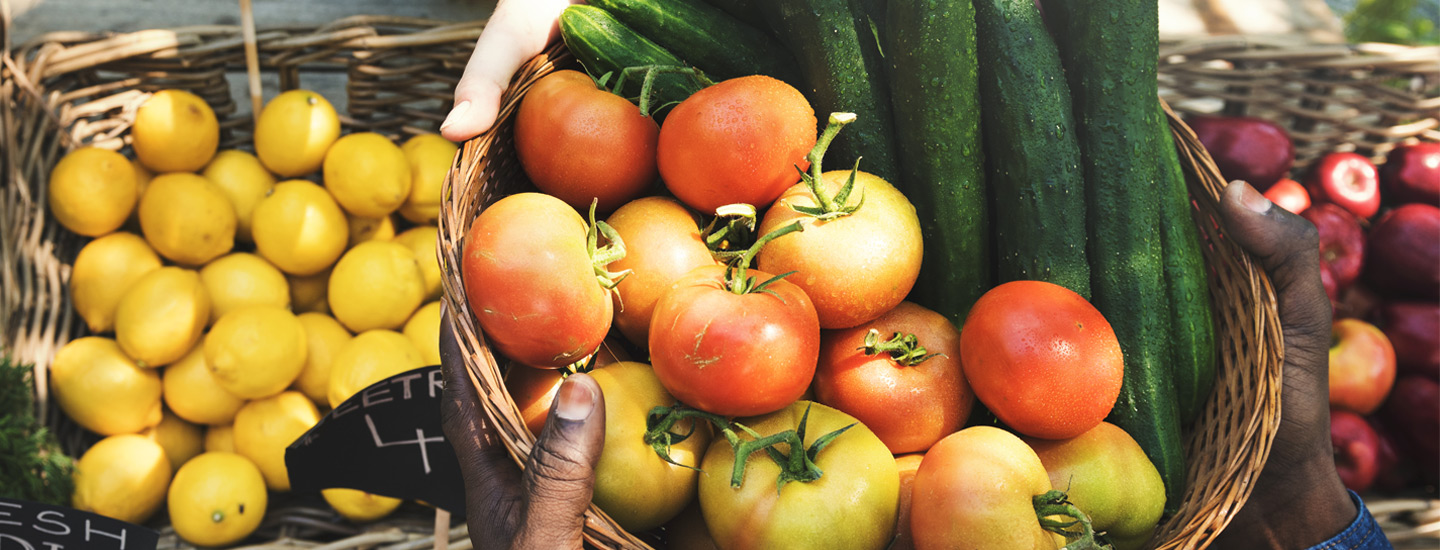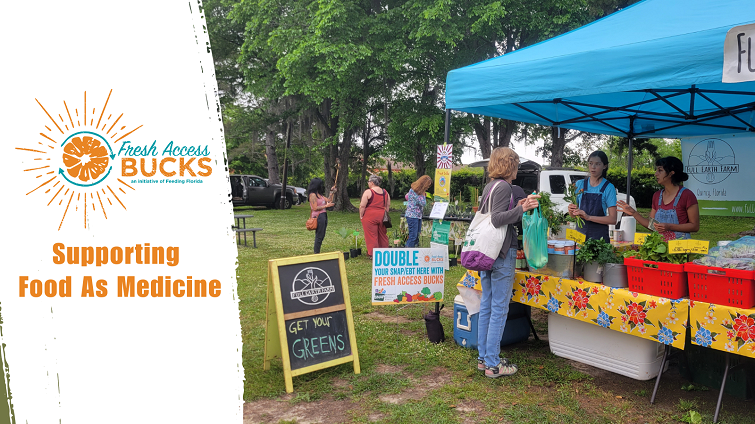Nutrition incentive programs like Feeding Florida’s Fresh Access Bucks (FAB) make fresh, local produce affordable and accessible to food insecure and under-resourced Floridians.
Why does this matter? Let’s look at the data:
- According to the Center for Disease Control and Prevention (CDC), only 1 in 10 Americans are eating enough fruits and vegetables
- Since 2020, those numbers have not improved
- In the case of fruit, daily intake has significantly decreased
- For food insecure and low-income individuals, daily fruit and vegetable intake was even lower
A healthier Florida is only going to be possible with healthier food options for ALL Floridians. That’s why FAB partners with a network of over 70 farmers, farmers markets, mobile markets and community grocery stores to bring fresh fruits and vegetables to Florida families.
The FAB program is funded through the USDA under the Gus Schumacher Nutrition Incentive Program (GusNIP) grant. This program allows customers within the Supplemental Nutrition Assistance Program (SNAP) to spend their benefits at farm-direct outlets and community grocery stores in the FAB program and receive a dollar-for-dollar match for free fresh fruits and vegetables. This means that customers shopping with SNAP at a farmers market spend $20 and receive an additional $20 in Fresh Access Bucks so that they can shop for Florida-grown fresh fruits and vegetables.
A low intake of fruits and vegetables is a key contributor to increased risk of disease and premature death in the United States, highlighting the strong connection between food and health. The United States Department of Health and Human Services (DOH) recognizes this connection and has launched the “Food as Medicine Initiative” this year through congressional funding to support the concept that access to nutritious food is critical for Americans’ health, well-being, and resilience.
FAB participants ate more fruits and vegetables per day than the average American.
FAB surveyed program participants in 2022 and found that the program is translating to increased access to fresh fruits and vegetables, as well as a significant increase in consumption of fresh fruits and vegetables. In fact, survey participants reported eating more fruits and vegetables the longer they were in the program, with the average daily consumption being 2.93 cups after six months shopping with FAB. The CDC recommends that adults consume 1.5–2 cup-equivalents of fruits and 2–3 cup-equivalents of vegetables daily, and FAB survey results show a positive trajectory toward reaching that goal.
Increased fruit and vegetable intake means FAB participants are at a lower risk of cancer, stroke, coronary heart disease, cardiovascular disease, type 2 diabetes and all-cause mortality. Eating more fruits and vegetables may also reduce risk of certain eye diseases, dementia, asthma and other lung disorders, arthritis, and osteoporosis.
Over a lifetime, fruit and vegetable incentive programs, in general, have the potential to prevent 1.93 million cardiovascular disease events, 0.35 million deaths caused by cardiovascular disease and save $40 billion in healthcare costs nationally. In just 5 years, programs like FAB will save about $1.21 billion dollars in healthcare costs in the US. And FAB participants are already self-reporting improved health. Last year, 80% of FAB survey participants reported their health as Good, Very Good, or Excellent after just six months in the program.
FAB hopes to expand on that success in the coming year in two ways.
First, FAB is working in partnership with Feeding Florida’s food banks on a produce prescription program. This would allow under-resourced Floridians to receive medically tailored meals and fruit and vegetable prescriptions in support of a Food as Medicine approach to preventing disease and improving health outcomes. Feeding Tampa Bay’s FoodRx program recently shared data that highlighted the benefit of programs like this. A staggering 72% of participants reported that food helped manage their health concerns and disease-specific data showed improvements in hemoglobin A1c levels for Type 2 Diabetes patients and reduced blood pressure for those with hypertension, among other positive health outcomes.
Second, there is a great need to provide healthy food options in rural Florida. FAB is asking the Florida Legislature for additional funds this year to expand the program into community grocers in rural Florida counties. When this rural grocer effort was a pilot program in 2021 with Hitchcock’s Market, the grocery store saw a 25% increase in produce sales and a 10% increase in overall store sales. We know the need exists, now we have to find creative ways to get healthy, nutritious foods to those who need it most.
“This program has impacted me so much in a very positive way. I have increased my fruit and veggie intake by over 65% ... it encourages healthier eating habits and is such a big help for people to stretch their SNAP benefits.”- FAB Customer at Hitchcock’s Market
The inclusion of fruit and vegetable incentive programs like FAB in the Food As Medicine space means we are reaching those most vulnerable to disease due to low access. FAB participants saw a 23% increase in their food security after just 6 months in the program, showing the potential in expanding that reach and improving the lives of families in Florida.
A collective effort to improve food security and the health and wellbeing of Floridians is underway at Feeding Florida and these efforts will shorten the line at food banks and reduce healthcare costs significantly.
------------------
The following are the resources and sources for the data referenced in this blog. For additional questions about Fresh Access Bucks, nutrition incentive programming, or the data referenced, please reach out to Meghan Fiveash.
Adults Meeting Fruit and Vegetable Intake Recommendations
https://www.cdc.gov/mmwr/volumes/71/wr/mm7101a1.htm
Changes in Food Consumption Trends among American Adults since the COVID-19 Pandemic
https://www.ncbi.nlm.nih.gov/pmc/articles/PMC10096875/
Fruit and Vegetable Intake and Mortality- Results From 2 Prospective Cohort Studies of US Men and Women and a Meta-Analysis of 26 Cohort Studies
https://www.ahajournals.org/doi/10.1161/CIRCULATIONAHA.120.048996
Fruit and vegetable intake and the risk of cardiovascular disease, total cancer and all-cause mortality-a systematic review and dose-response meta-analysis of prospective studies
https://pubmed.ncbi.nlm.nih.gov/28338764/
Critical review: vegetables and fruit in the prevention of chronic diseases
https://www.ncbi.nlm.nih.gov/pmc/articles/PMC3419346/
Cost-effectiveness of financial incentives for improving diet and health through Medicare and Medicaid: A microsimulation study
https://www.ncbi.nlm.nih.gov/pmc/articles/PMC6424388/


